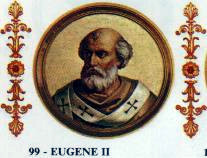Pope Eugenius II
|
Pope Eugene II |
|
|---|---|
 |
|
| Papacy began | 11 May 824 |
| Papacy ended | 27 August 827 |
| Predecessor | Paschal I |
| Successor | Valentine |
| Personal details | |
| Birth name | Eugenio Savelli |
| Born | 780 Rome, Papal States |
| Died | 27 August 827 Rome, Papal States |
Pope Eugene II (Latin: Eugenius II; died 27 August 827) was Pope from 11 May 824 to his death in 827. A native of Rome, he was chosen to succeed Paschal I. Another candidate, Zinzinnus, was proposed by the plebeian faction, and the presence of Lothair I, son of the Frankish emperor Louis the Pious, was necessary in order to maintain the authority of the new pope. Lothair took advantage of this opportunity to redress many abuses in the papal administration, to vest the election of the pope in the nobles, and to confirm the statute that no pope should be consecrated until his election had the approval of the Frankish emperor.
He was elected pope on 6 June 824, after the death of Paschal I. The late pope had attempted to curb the rapidly increasing power of the Roman nobility, who had turned for support to the Franks to strengthen their positions against him. When Paschal died, these nobles made strenuous efforts to replace him with a candidate of their own. The clergy put forward a candidate likely to continue the policy of Paschal. However, even though the Roman Council of 769 under Stephen IV had decreed that the nobles had no right to a real share in a papal election, the nobles were successful in securing the consecration of Eugene, who was archpriest of St Sabina on the Aventine. Their candidate is said in earlier editions of the Liber Pontificalis to have been the son of Boemund, but in the more recent and more accurate editions, his father's name is not given. While archpriest of the Roman Church, he is credited with having fulfilled most conscientiously the duties of his position. After he became pope, he beautified his ancient church of St. Sabina with mosaics and metalwork bearing his name that were still intact as late as the 16th century. Eugene is described by his biographer as simple and humble, learned and eloquent, handsome and generous, a lover of peace, and wholly occupied with the thought of doing what was pleasing to God.
...
Wikipedia
